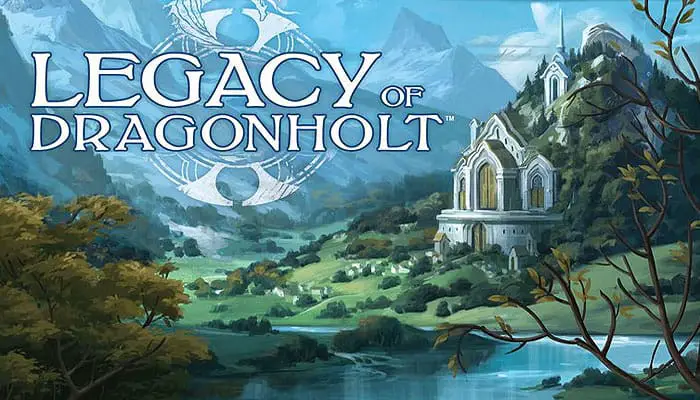
Legacy of Dragonholt is a cooperative narrative adventure game in which one to six players take on the role of heroes. This game contains a single campaign, during which you-the heroes-undertake quests by venturing into dark caves and dangerous forests.
Along the way, you will encounter vicious monsters and cunning bandits, earn wealth and fame, and possibly foil the plot of an evil overlord.

Components
- 20 Item Cards
- 6 Quest books
- 6 blank Character sheets
- Activation tokens
- 1 Village book
- To New Roads book
- Character Creation Book
- Map of Dragonholt
- Sonia's journal.
- Letter from Celyse
- Rulebook
Game Elements
This section describes the various components.

The rulebook and the character creation book will assist you with setup and character creation. While playing, you should refer to the rulebook if you have any rules questions.
The six quest books and one village book contain all of the stories and adventures you will experience while playing. You should not read from the quest books or village book unless you have been instructed to do so.
Likewise, while reading an entry in one of these books, do your best not to read other entries on the same page unless instructed to do so. The last step of setup will instruct you to begin reading from the "To New Roads" quest book.

You will be instructed to read the letter from Celyse during the first adventure. You may refer back to and reread the letter any time that you wish.
Your adventure will take you to Dragonholt, a sleepy farming village. You will receive a map of Dragonholt after you arrive in the village.
Later in your adventures, you might find Sonia's journal. Do not examine this component until you are instructed to do so. It might hold the key to solving a mystery, resolving some issue, or completing a quest.

The twenty item cards should be kept in a facedown deck while playing. You will be instructed to gain some of these cards during your adventures. Do not examine the front face of any card until you are instructed to gain that card. The back of each card indicates its unique identifier ("A", "B", "C", etc)..
If playing with multiple players, you will use activation tokens to track which players have made decisions.

The six blank character sheets can be used to record information about your character during character creation.
Object of the Game
Legacy of Dragonholt is a cooperative game. That is, if you are playing with more than one player, all of you are on the same team. However, unlike other games, Legacy of Dragonholt is not about winning or losing.
Legacy of Dragonholt is a game about storytelling. As you play, your decisions will weave a narrative tapestry that tells the story of your adventures in the village of Dragonholt.
You take on the role of a hero, a brave adventurer who seeks fame and fortune either by performing acts of good and honor or simply by seeking out monsters to battle or villagers to save.
While playing Legacy of Dragonholt, you will tell a continuous story related to your adventures. When one adventure ends, another can begin. The game comes to an end when you reach the story's natural conclusion. What that conclusion is, however, depends entirely on the decisions you make on your adventures.
Unlike some other games, winning and losing in Legacy of Dragonholt is not black and white. The decisions you make will have far reaching consequences that ultimately affect the outcome of the story. You might fail to find a fabled treasure or to save an innocent victim, but if you enjoy the story, that is a victory.
Setup
To begin a new game, perform the following steps in order:
-

Create your Hero(es)
The first step is to create your hero-an avatar that represents you in the story. The character creation book gives the full rules for creating a hero. Th at book also includes an example of creating a hero from beginning to end.
Read through the character creation book and follow the steps for creating a hero.
If playing with two or more players, each player takes one activation token. Activation tokens are used to track which heroes have acted during your adventures.
-
Prepare The Story Tracking Sheet
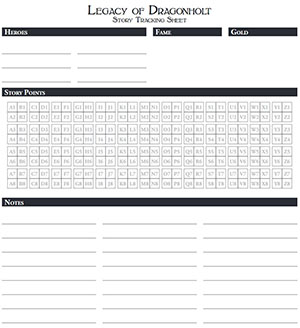
On the story tracking sheet (located on the back cover of this document), record the following information:
You begin the game with 100 gold. Gold can be used to purchase items and pay for training during your adventures. If you are playing with multiple heroes, gold is shared among all heroes.
You begin the game with two fame. Your fame increases as you become more well known or your efforts are acknowledged by the nobility or townsfolk. Like gold, fame is shared by all heroes.
Leave all story points unmarked. Story points will be marked during your adventures to track the decisions you've made.
-
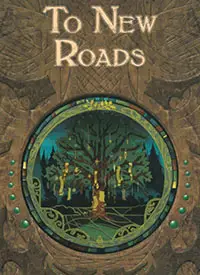
Begin The First Quest
During your adventures, you will be instructed to read specific entries in a quest book.
When instructed to read an entry, you might wish to record the entry number on the tracking sheet for that quest. You may reread any entry that you have previously read at any time.
To complete setup and begin the first quest, find the "To New Roads" quest book and read entry 1000.
Rules Glossary
This rules glossary describes all rules and terminology for Legacy of Dragonholt in detail and lists them in alphabetical order by topic. Each entry describes the basic rules for the topic first, followed by any complexities or exceptions that pertain to the topic.
The purpose of this rules glossary is not to teach the game. The rules sidebars in the "To New Roads" quest book are written to teach new players how to play Legacy of Dragonholt during that quest.
This rules glossary is intended to be used as a reference when questions arise during the game. This rules glossary is the definitive source of rules information.
If something in this glossary contradicts a rules sidebar in the "To New Roads" quest book or the character creation book, this glossary takes precedence.
Activation Tokens

Activation tokens are used to track which players have made decisions. Activation tokens are used only if playing with two or more players. In such a case, each player has an activation token.
When you make a decision, exhaust your token (turning it facedown). You cannot make another decision until your activation token is refreshed.
When all players have exhausted their activation tokens, all players refresh their activation tokens (turning them faceup).
Active Player
The active player is whichever player made a decision most recently.
The word "you" in an effect (text preceded by an arrow) refers to you, the active player. The words "you each" refer to each hero individually.
Conditional Effects
Some effects occur only if specified conditions are met. Conditional statements (represented by italic text and beginning with "if") state the specific conditions required for the effects to occur.
If multiple conditional statements are given and the requirements for multiple conditions are met, only the effects of the first conditional statement will occur.
An "otherwise" statement will indicate what effects occur if none of the previous conditional requirements are met.
Conditional effects are not decisions. They do not require you to make a decision nor do they cause your activation token to be exhausted.
Days

The encounters in the "Dragonholt Village" book take place over multiple days as tracked on the tracking sheet on the back cover of that book.
At the end of each day, an effect on the tracking sheet will instruct you to read a specific entry that bridges the gap between the day that just ended and the next day in the story.
You cannot gain the benefits of an entry more than once per day.
Decisions
During your adventures, you will decide how you react to situations and how you act in general. Options (seen in the example below) are easy to identify by their white text on dark-red background.
When you reach a decision point-a set of two or more options-you will read each of the available options and choose the one you prefer.
Example decision point:
The tea house is a small but elegant building. It doesn't appear to be open at the moment. Actually, you're not sure you've ever seen anyone enter or leave the shop. Despite that, the street decorations in front of the store are always well maintained.
- Knock on the door -> Read entry 2979.
- Break down the door ->Mark story point N5, Read entry 7363.
- Pick the lock and sneak inside -> Requires thievery (skill), Read entry 7267.
-
When you choose an option, you resolve each effect found below that option. Each effect is preceded by an arrow.
In the above example, if you choose the "Knock on the door" option, you are instructed to read entry 2979. However, if you choose the "Break down the door" option, you are instructed to mark story point N5 and then read entry 7363.
-
Some options require you to have a specific skill or some other condition to be true. You cannot choose an option if its requirements are not met.
In the above example, the "Pick the lock and sneak inside". option cannot be chosen unless you have the thievery skill.
Effect
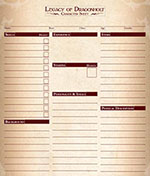
An effect is a passage of the story that is recorded on a tracking sheet or character sheet. Each effect is represented by a passage of italic text preceded by an arrow.
The word "you" in an effect refers to you, the active player. The words "you each" refer to each hero individually.
Encounter
The "Dragonholt Village" book is divided into a number of encounters. Each encounter is a short collection of related entries. Once you begin an encounter, continue reading as normal until the encounter is complete.
Entry
An entry is a short passage of narrative text usually relating to a single event or decision.
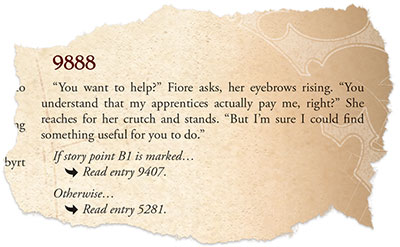
-
Each entry has a unique, four-digit entry number.
-
Each entry contains one or more effects (represented by italic text preceded by an arrow). At least one effect in each entry instructs you to read another entry and/or completes the current quest or encounter.
Some such effects occur only if specified conditions are met. Conditional statements (represented by italic text and beginning with "if") state the specific conditions required for the effects to occur.
An "otherwise" statement will indicate what effects occur if none of the previous conditional requirements are met.
-
Some entries include a decision point-a collection of options (represented by white text on a dark-red background) and their effects.
Experience
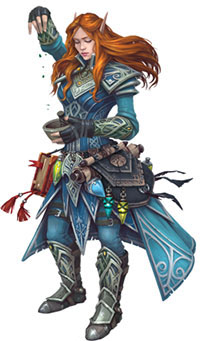
At the end of a quest or after a particularly harrowing event, an effect might cause you to gain one or more experience. Experience is an abstract measure of what you have learned during your adventures.
When you gain experience, record the amount of experience you have accrued on your character sheet.
On the "Dragonholt Village" tracking sheet, there are several effects that allow you to spend experience to learn new skills as long as enough progress has been made in related training.
Fame
As you complete your adventures, you will accrue fame. Fame is an abstract measure of how well known you are to the public and how they feel about you as heroes. A high fame indicates that you are well known and well liked by the community.
- Fame is recorded on the story tracking sheet.
- Fame is shared by all players.
Gold
During your adventures, you will accrue gold. Gold can be used to purchase items and pay for training.
- Gold is recorded on the story tracking sheet.
- Gold is shared by all players.
Heroism
Heroism is a specific type of progress that represents your heroic efforts within Dragonholt and the surrounding area. Heroism is recorded on the "Dragonholt Village" tracking sheet.
As you reach certain thresholds of heroism, you will be rewarded with experience, fame, and an increase to your maximum stamina as described on the "Dragonholt Village" tracking sheet.
Items
Some effects cause you to gain items. Items are cards and are kept in a facedown deck.
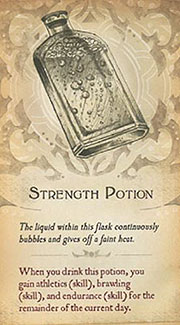
-
When an effect instructs you to gain an item, record the item's name on your character sheet, then find the specified item card. Keep the card faceup with your character sheet.
While searching the deck for a card, look at only the backs of the cards to find the unique identifier of the specified card.
-
You may give any number of your items to another hero at any time. However, you may do so only if your activation token is not exhausted. Doing so does not exhaust your activation token.
-
You can gain more than one of certain items (such as potions). However, there is only one copy of each item card, which should be shared as a reference among all players.
-
When you lose an item, remove that item from your character sheet. If no other hero has more of that item, also return the item card to the deck.
Location
A location is just that-a physical location in the village of Dragonholt.
- Each location has a four-digit number that corresponds to an entry in the "Dragonholt Village" book.
- After reading each encounter in the "Dragonholt Village" book, use the map of Dragonholt to choose a new location to visit.
Map of Dragonholt

After reading each encounter in the "Dragonholt Village" book, use the map of Dragonholt to choose a new location to visit.
Each location has a four-digit number that corresponds to an entry in the "Dragonholt Village" book. When you choose a location, read the corresponding entry.
You cannot choose a location if you are currently reading another quest or encounter.

Multiple Players
If you are playing alone (one player), you will make all decisions. However, if you are playing with two or more players, you will each take turns making decisions. The following rules apply only if playing with two or more players.
Each player has an activation token.
When you reach a decision point, one of the players will make that decision. Determine who will make each decision as a group.
When you make a decision, exhaust your activation token (turning it facedown). You cannot make another decision until your activation token is refreshed.
When all players have exhausted their activation tokens, all players refresh their activation tokens (turning them faceup).
When you make a decision, you become the active player. You remain the active player until another player makes a decision.
The word "you" in an effect refers to you, the active player. The words "you each" refer to each hero individually.
Dragonholt Village
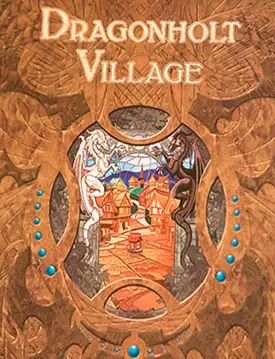
The rules above apply while reading from any of the quest books. These rules also apply while reading the "Dragonholt Village" book, except as stated below:
You each take turns choosing a location to visit. Determine who will choose a location as a group.
When you choose a location, exhaust your activation token (turning it facedown). You cannot choose another location until your activation token is refreshed.
When you choose a location, you become the active player, and you remain the active player until the corresponding encounter is complete.
All decisions made during an encounter should be made as a group. You do not exhaust your activation token when you make a decision, and requirements on options can be fulfilled by any of you.
As the active player, you have the final say on those decisions.
Potions
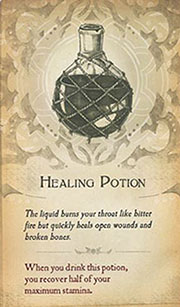
You may drink a potion at any time. When you drink a potion, you receive the benefits listed on the potion item card.
If playing with two or more heroes, you can drink a potion only if your activation token is not exhausted. Drinking a potion does not exhaust your activation token.
You must have at least one potion of a type recorded on your character sheet to drink a potion of that type.
When you drink a potion, reduce by one the number of that potion you have recorded on your character sheet.
Progress
Each unit of progress represents an abstract recording of the strides you have made in various endeavors. It allows you to slowly work toward larger goals. Progress is recorded on the "Dragonholt Village" tracking sheet or on the tracking sheet for the current quest.
When you are instructed to mark one or more progress, locate the type of progress on the tracking sheet for the current quest, then mark that many boxes of progress.
Progress is referenced throughout your adventures.

Skills
Skills represent your inherent talents and the training you have received. Each skill corresponds to some talent or set of tasks. Having a particular skill means that you have a certain level of training or expertise with that task.
Your skills provide you with additional options when making decisions and improve your chances of success while attempting to perform a task related to your skills.
Disabled Skills
When your current stamina is reduced to zero, choose one of your skills. The chosen skill is disabled, then you recover one stamina.
While a skill is disabled, you are treated as if you do not have that skill.
When an effect instructs you to recover a skill, choose one of your disabled skills. The chosen skill is no longer disabled.
Learning New Skills
As you progress through the campaign, you will gain experience that you can spend to learn new skills.
On the "Dragonholt Village" tracking sheet, there are several effects that allow you to spend experience to learn new skills as long as enough progress has been made in related training.
Stamina
Stamina is a measure of how much you can push yourself or resist strain or damage. Excessive amounts of physical labor, prolonged exposure to harsh conditions, and physical damage suffered in combat all cause you to lose stamina.
Your maximum stamina is determined during character creation.
Whenever you lose stamina, subtract that amount from your current stamina, recording your current stamina separate from your maximum stamina.
Whenever you recover stamina, increase your current stamina by the amount specified by the effect that causes you to recover stamina.
Your current stamina cannot exceed your maximum stamina, nor can it fall below zero. If your current stamina would be reduced to below zero, it is reduced to zero instead.
Falling to zero stamina
When your current stamina is reduced to zero, choose one of your skills. The chosen skill is disabled, then you recover one stamina.
- While a skill is disabled, you are treated as if you do not have that skill.
- When an effect instructs you to recover a skill, choose one of your disabled skills. The chosen skill is no longer disabled.
Story Points
Story points are abstract recordings of the decisions you make throughout your adventures. They allow the story to play out differently depending on the decisions you've made. Story points are recorded on the story tracking sheet.
When you are instructed to mark one or more story points, locate the story point on the story tracking sheet by referencing its letter and number, then mark that box.
Story points are referenced throughout your adventures.
Each story point is either marked or not marked. Marking a story point more than once has no additional effect.

Time
Each unit of time represents an abstract amount of time, which could be anything from a few minutes to multiple hours, depending on the current quest. It is used to track how long your actions have taken. Time is recorded on the tracking sheet for the current quest.
Time is referenced throughout your adventures.
When one or more time passes, mark that many boxes of time on the tracking sheet for the current quest.
Time in the "Dragonholt Village" book is divided into seven days.
When an effect causes two or more time to pass, mark time only for the current day. Do not mark time for the next day if all boxes for the current day have been filled.
Continue Reading
